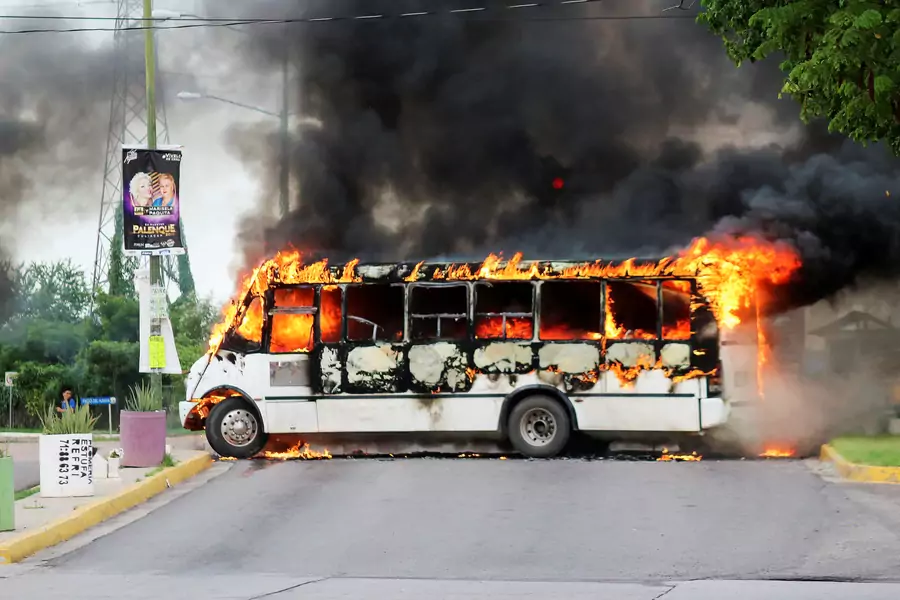AMLO’s ‘Hugs Not Bullets’ Is Failing Mexico

Last week, the streets of Culiacan, the capital of Mexico’s Sinaloa state, became a battlefield, with the Sinaloa cartel directly confronting the government and winning. The week before, 13 police officers were killed in an ambush in Michoacan, likely by the Jalisco Nueva Generacion cartel. Overall, murders and kidnappings are at record levels and spreading through Mexico’s once-safer industrial heartland and capital city.
Talk of Mexico becoming a failed state is again on the rise. Two decades ago, the last time experts were so worried, the U.S. and Mexico formed a historic security partnership. That’s unlikely to happen again. Both nations will suffer as a result.
More on:
Rising violence helped propel President Andres Manuel Lopez Obrador, popularly known as AMLO, into office, with Mexicans’ desperation for basic safety a key driver of the vote for change. He promised a seismic shift, ending the war on drugs with “hugs not bullets.” A new 60,000-strong National Guard would replace a tainted federal police. And the militarized enforcement would give way to new scholarships, stipends, and drug treatment.
Yet nearly a year on, security has deteriorated. Drug-funded cartels aren’t the only threat. Dozens of criminal groups profit from human trafficking, extortion, kidnapping, and protection rackets (avocados a lucrative favorite).
Things won’t improve anytime soon. AMLO’s social approach to preventing violence will take years to translate into real change on the ground, if it ever works. His new National Guard will also take time to hire, train and cohere in the best of circumstances. Today’s circumstances are far from that: The first round of recruits, mostly recycled from the military and federal police, have been sent to round up Central American migrants rather than fight criminals. Even the most promising of security policies can’t get far without money, and AMLO hasn’t raised security spending from less than 1% of gross domestic product.
The last time Mexico faced such peril, it turned to the United States. The U.S. government responded, recognizing its role in the drug trade and stake in a secure Mexico. In 2007 presidents Felipe Calderon and George W. Bush hashed out a historic security agreement that came to be known as the Merida Initiative. Over the course of the next decade the U.S. would spend more than $1.6 billion, and Mexico billions more, to dismantle criminal organizations, strengthen Mexico’s rule of law, modernize the border, and help violence-ridden communities. As important as money, Merida overcame a historically fraught bilateral security relationship, building trust and cooperation.
The prolonged gunfight that set Culiacan ablaze came from a botched attempt to fulfill a long-standing U.S. request to extradite one of the sons of Chapo Guzman, former head of the Sinaloa cartel. In the aftermath, AMLO and President Donald Trump talked and reaffirmed the “solidarity” between the two nations. But that doesn’t mean a revival of close cooperation. AMLO’s nationalistic political base remains deeply suspicious of all U.S. motives; he isn’t likely to ask for help, even if he needs it. AMLO has bashed the Merida initiative for its military ways — though in truth the partnership turned away long ago from providing helicopters and hardware to training police officers and supporting justice reforms.
More on:
Even if the Mexican president did turn to the U.S. for help, few on the U.S. side are there to heed the call. Trump’s last confirmed Assistant Secretary of State for the Western Hemisphere exited the building in August after only 10 months in office. The Department of Homeland Security is losing its third secretary in just six months (many deputy posts also remain empty or filled by acting officials). Moreover, the department’s resources have moved away from drugs and border security to migrants.
The U.S. isn’t immune to stepped-up violence in Mexico. Its economic costs hit U.S. factories, offices, and workers whose jobs depend on exports south (Mexico remains the second biggest U.S. customer in the world). Violence and crime can also slow or disrupt the flow of parts that help make the U.S. auto, aerospace, medical equipment, and other regional industries globally competitive. Dozens of U.S. companies, including General Motors Co., Honeywell International Inc., Nordam Group Inc., and Medtronic Plc, depend on the speedy delivery of Mexican-made components to keep their operations running in Michigan, Minnesota, North Carolina and Oklahoma.
The violence will also exacerbate and accelerate migration north. Mexican refugees don’t need to travel thousands of miles to reach the U.S., nor can they be stopped by the National Guard. U.S. border personnel are already seeing a sharp uptick in Mexican asylum seekers.
So what are the two nations to do? Stop worrying so much about sovereignty and focus on what will save lives. And that is taking on organized crime together. To do so means revisiting and doubling down on the four principles of the Merida Initiative: Strategically going after the bad guys, focusing border resources less on stopping fleeing families than on curbing the flows of drugs, guns, and illicit money, and especially strengthening the rule of law and helping stricken communities.
Mexico of course needs to step up and deal with its own problems (starting with a huge bump in security spending). But cross-border causes of violence demand cross-border solutions. The two governments need once again to expand the cooperative (versus coercive) parts of the bilateral agenda beyond just passing the USMCA trade agreement. Both presidents must recognize that security at home depends on making all of North America safer.
 Online Store
Online Store